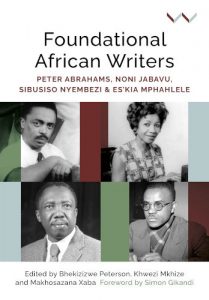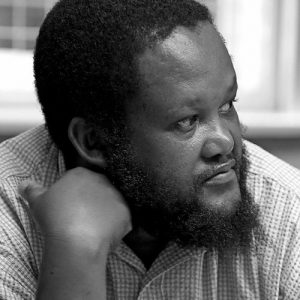The JRB presents an excerpt from Foundational African Writers: Peter Abrahams, Noni Jabavu, Sibusiso Nyembezi and Es’kia Mphahlele, edited by the late Bhekizizwe Peterson, Khwezi Mkhize and Makhosazana Xaba.

Foundational African Writers: Peter Abrahams, Noni Jabavu, Sibusiso Nyembezi and Es’kia Mphahlele
Edited by Bhekizizwe Peterson, Khwezi Mkhize, Makhosazana Xaba
Wits University Press, 2022
Tribute to Professor Bhekizizwe Peterson
Jill Bradbury, Khwezi Mkhize and Makhosazana Xaba

On 15 June 2021, our beloved Bhekizizwe Peterson transitioned to the realm of the ancestors. A project of this scope and depth was only possible within the characteristically careful and capacious intellectual frame that he provided and we are deeply thankful for this final gift from him. As he joins the four centenarians honoured in this book and many amongst those we call our ancestors, we feel this book speaks vividly to the vision and calling that he lived. Foundational African Writers is a living testament to his lifelong passion for restoring African writers to their rightful place as meaningful custodians and interpreters of the African experience.
His vast and encompassing vision enabled the collection of these four foundational writers in one volume, placing their work in dialogue across time and space, exiled and at home, and crossing other boundaries of gender, generation, language and territories within and beyond the academy. This was already a mammoth task, which was further complicated by the aspirational inclusion of contributions from scholars beyond the field of African literature, from education, politics, music, linguistics and psychology. This would have been an unwieldy and fragmented collection without him as the lynchpin, without his range of scholarship that traversed all of these terrains.
In the past few years Bhekizizwe Peterson’s energies were concentrated in the Narrative Enquiry for Social Transformation (NEST) Project, in which he was principal investigator alongside Jill Bradbury. NEST is a network of scholars and artists across multiple disciplines, utilising narrative methodologies to explore the links between individual life stories and socio-political histories. NEST provided the crucible for the development of Foundational African Writers. His insistence on working collaboratively was something of an ethical necessity for him, as expressed in his thoughtful dialogue with each author in the collective. His mode of engagement reminds us that any worthwhile intellectual endeavour is itself a striving for the sense of community that will bring about the continuity of our aspirations with the aspirations of those who have come before us and those who are yet to come.
Foundational African Writers is but one of many examples of the ethic of generosity and intergenerational collaboration that he so deeply treasured. In 2018 he invited the co-editors of this book to work with him, most democratically sharing the various labours and responsibilities that come with realising a project of this magnitude. In hindsight, his ever-gentle insistence that the chapters of this book be presented at conferences between Africa and the USA brought to life the transnational itineraries of the centenarians as well as the important and living legacy of the institution of African literature. In the year of Jabavu, Nyembezi, Abrahams and Mphahlele’s centenaries in 2019, a number of colloquia and conference panels were organised to mark and celebrate the occasion. The first conference that hosted a panel on the centenarians was that of the African Literature Association (ALA) which took place in Columbus, Ohio, in May of 2019. Professor Es’kia Mphahlele was a founding member of the ALA in 1975. It is therefore greatly significant that Foundational African Writers commenced there. The fifth NEST Colloquium and Winter School held a series of panels between 4 and 6 July 2019. These included the second panel on the centenerians as well as the Es’kia Mphahlele Postgraduate Colloquium and Arts Forum. Following this generative forum, several authors in this collection presented their work at the fourth Eastern African Literary and Cultural Studies Conference held in Ethiopia in August of 2019. Travelling across the continent to engage in Pan-African dialogues was not a new experience for Bheki, but it was the first time that he had visited the beautiful ancient churches of Lalibela in which the deep history and art of Africa are inscribed and commemorated. It was a moment of profound joy for him. The Pan-African itinerary that Foundational African Writers took from conference presentations to book chapters took shape under the attentive, patient and tireless guidance of Bhekizizwe Peterson and this, we believe, makes this a book with a story of as much as on the histories and figures that it honours.
The contours of this volume are shaped by Bhekizizwe Peterson’s invigoration of our thinking and writing, by our conversations and shared life. His analytical rigour and exacting demands were always exercised with generosity and humour, enabling those of us who had the privilege of working alongside him to do our best work. He drew us up and out of ourselves, towards better versions of ourselves as artists, intellectuals, activists—as human beings. In gratitude, we dedicate the book to his living memory.
~~~
- Bhekizizwe (Bheki) Peterson, who passed away when this book was in preparation, was a South African intellectual, script writer and film producer and Professor of African Literature at the University of the Witwatersrand, Johannesburg. He published extensively on African literature, performance and cultural studies as well as black intellectual traditions in South Africa.
- Khwezi Mkhize is Senior Lecturer in the Department of African Literature at the University of the Witwatersrand, and an affiliate of the Narrative Enquiry for Social Transformation programme.
- The JRB Patron Makhosazana Xaba is a research associate at the Wits Institute of Social and Economic Research (WiSER). She is a multi-genre anthologist, and has published four poetry collections and an award-winning collection of short stories.
Publisher information
‘This is an important and visionary project, assured of its own ethical and political worth, and the work of years of collaboration across generations, regions and intellectual traditions; it maps that which it also creates through the groundbreaking world-making of the research network.’—Carli Coetzee, Editor, Journal of African Cultural Studies
‘This well-crafted collection recovers the seminal position of four of the most important twenty-first-century African writers who have been absent from the canon and recalibrates the distinctive development of African literature.’—Mpalive Msiska, Associate Professor and Programme Director, Department of English and Humanities, Birkbeck College, University of London
The essays in this collection were written in celebration of the centenaries, in 2019, of Peter Abrahams, Noni Jabavu, Sibusiso Cyril Lincoln Nyembezi and Es’kia Mphahlele, all of whom were born in 1919. All four centenarians lived rich and diverse lives across several continents. In the years following World War II they produced more than half a century of foundational creative writing and literary criticism, and made stellar contributions to the founding and enhancement of institutions and repertoires of African and black arts and letters in South Africa and internationally. As a result, their lifeworlds and oeuvres present sharp and multifaceted engagements with and generative insights into a wide range of issues, including precolonial existence, colonialism, empire, race, culture, identity, class, the language question, tradition, modernity, exile, Pan-Africanism, and decolonisation.
The range of the centenarians’ imaginations, critical analysis and social interventions spanned conventional disciplinary divides. This volume, in the same spirit, draws on perspectives and approaches that are equally transdisciplinary in their modalities. Two aims thread through the contributors’ reflections on the complexities of black existence and of intellectual and cultural life in the twentieth century. The first is the exploration of some of the centenarians’ key texts and cultural projects, in which the chapter authors consider questions relating to the sociopolitical antecedents and repertoires that shaped Peter Abrahams, Noni Jabavu, Sibusiso Nyembezi and Es’kia Mphahlele and that, in turn, constitute their legacies. In doing so, the authors trace a number of intellectual and aesthetic lineages that can be identified in the works and organisational activities of the centenarians, and explore the convergences and divergences, contradictions and paradoxes of these lineages. The second aim of the essays is to consider ways in which these foundational writers’ legacies continue to resonate today, confirming their status as crucial contributors to the genealogies and institutions of modern African and diasporic black arts and letters.





